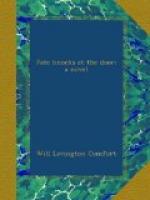Directly from his old Japanese teacher, and subtly from the Bhagavad Gita and the modern prophets, Bedient felt strongly urged to India. This culminated in 1903, when he was twenty-five years old. Hatred of Russia was powerfully fomenting through the Japanese nation at this time. Bedient grew sick at the thought of the coming struggle, but delayed leaving for several weeks, in the hope of seeing David Cairns, who, surely enough, was one of the first of the war-correspondents to reach Tokyo late that year. Cairns had put on pounds and power, and only Bedient knew at the end of certain fine days together, that the beauty of their first relation had not returned in its fullness.... They parted (a third time during five years) in the wintry rain on the water-front at Yokohama, Cairns remaining and Bedient taking ship for Calcutta.
Up into the Punjab he went with the new year; and there, all but lost trace of time and the world. He seemed to have come home—an ineffable emotion. When they told him quite seriously that the Ganges was sent from heaven, and had wandered a thousand years in the hair of Shiv before flowing down upon the plains with beauty and plenty and healing for sin-spent man—Bedient instantly comprehended the meaning of the figure: that the hair of Shiv was the Himalayas, whose peaks continually rape the rain-clouds. And the lotos—name, fragrance and sight of this flower—started a little lyrical wheel tinkling in his mind, turning off snatches of verses that sung themselves; and fluttering bits of romance, half-religious and altogether impersonal; and strange pictures, lovely, though all but effaced.
Indeed, he was one with the Hindus in a love for the bees, the silence, the mountains, rivers, the moon, and the heaven-protected cattle, in whose great soft eyes he found the completion of animal peace.... The legend that the bees had come from Venus, with the perfect cereal, wheat, as patterns of perfection from that farther evolved planet—fascinated, became the leit-motif of his thoughts for weeks. Earth had earned a special dispensation, it was said, and bright messengers came with a swarm and a sheaf, each milleniums advanced beyond any species of its kind here.
From a little boy he had loved the bees. Afternoons long ago (this was clear to him as the memory of that sinister hall-way of yellow-green light which returned on the afternoon of the great wind) he had lain upon the grass somewhere, and heard the hum of the honey-gatherers in thistle and clover. The hum was like the far singing of a child-choir, and the dreamings it started then were altogether too big for the memory mechanism of a little boy’s head; but the vastness and wonder of those dreamings left a kind of bushed beauty far back in his mind. He had loved the bees as he had loved the Bhagavad Gita, thinking it peculiarly his own attraction, but when the world’s great poets and prophets became known to him through




